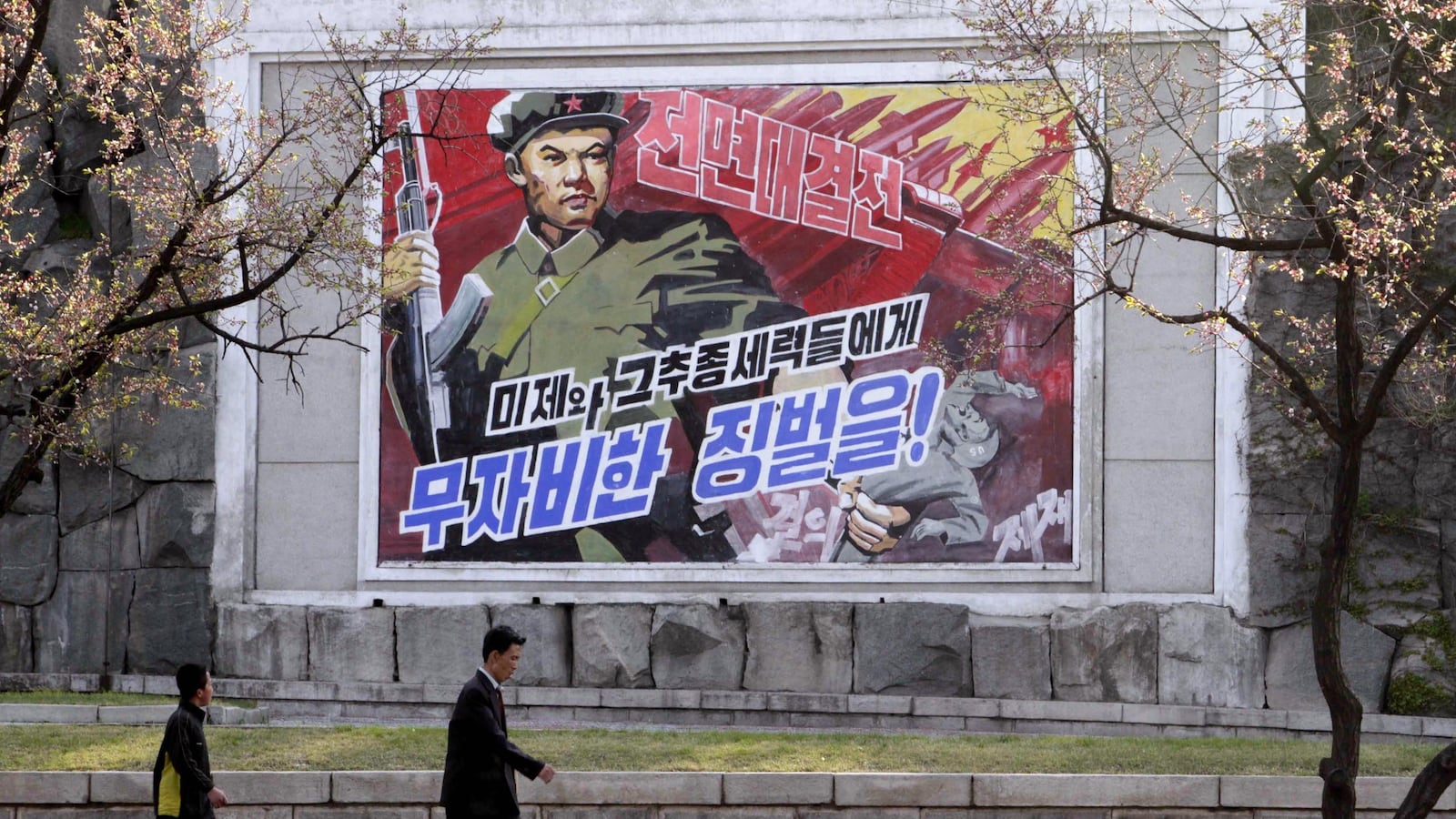When North Korea’s Supreme Court sentenced the American citizen Kenneth Bae to 15 years of hard labor for “hostile acts”—a lesser charge than the capital crime of attempting to overthrow the government which Pyongyang had leveled at him earlier but a harsh punishment nonetheless—it was clear the North Koreans wanted to send a signal.

Having declared that it had entered “a state of war” with South Korea at the end of March, North Korea, led by its immature leader Kim Jong-un, is clearly trying to get the world’s attention—this time by parading its hostages to the world.
Bae, an ethnic Korean who reportedly took photographs of starving children while working as a tour guide, was detained in November, and his sentencing Thursday designed for maximum effect. And Bae, also known as Pae Jun-ho, isn’t the only person Pyongyang has seized recently. On Monday the North refused to allow the last seven South Korean managers working in a now shuttered industrial complex just a few miles north of the demilitarized zone to return to the South.
Still, from the regime’s point of view, American hostages are much more effective, which is why there have been quite a few of them, including Evan Hunziker in 1996, Robert Park and Aijalon Mahli Gomes in 2010, and Eddie Jun Yong-su in 2011. In each case, the strategic and geopolitical reasons for the timing of the sentences and releases have been quite apparent, and if there is a previous case to learn from, Bae’s most closely resembles the 2009 made-for-television drama that centered on two American journalists, Laura Ling and Euna Lee, who crossed from China into North Korea without visas.
At the time, North Korea supremo Kim Jong-il appeared to be suffering from numerous life-threatening ailments, including kidney failure and pancreatic cancer, in addition to the various aftereffects of stroke, and had, by most accounts, ceded powers to hard-line generals to obtain the support of the military for the succession of the youngest of his sons, Kim Jong-un, then age 25 or 26.
The arrests of Ling and Lee, who were sentenced to 12 years of hard labor, gave Kim Jong-il a bargaining chip when dealing with the Americans. The North Korean leader wanted many things during the covert negotiations with the Obama administration over the release of the journalists. But at the top of the list was a photograph of him standing next to Bill Clinton. The day after Clinton’s arrival in North Korea, the Americans were released, and the president later used the image of Clinton in North Korea to show America paying homage to the Kim family, thereby bolstering its legitimacy.
Today we have another fragile Pyongyang regime, this one headed by Kim Jongil’s still-wet-behind-the-ears son. Kim Jong-un, who’s been in power for less than 17 months, has yet to consolidate his position since the sudden death of his dad. At no time since 1949 has a North Korean leader had a smaller base of support than the young Kim has today. And Kenneth Bae provides another opportunity for a Kim to be photographed side by side with a senior American figure.
By dropping the more serious charges against Bae and keeping him alive, Kim has avoided the international outrage an execution would have brought with it. Yet, by imposing a harsh sentence that, for many prisoners, is tantamount to a death sentence, he has also put pressure on the Obama administration.

“There is no greater priority for us than the welfare and safety of U.S. citizens abroad, and we urge the DPRK authorities to grant Mr. Bae amnesty and immediate release,” said State Department spokesman Patrick Ventrell on Thursday.
And in the weeks ahead, the State Department and freelance diplomats will continue to seek the release of Bae from the prison camp known as the Democratic People’s Republic of Korea.
Indeed, people are lining up to try to spring Bae. Former governor Bill Richardson, who won freedom for Hunziker, tried in January to meet with Bae, but was rebuffed by the regime. Jimmy Carter, who secured Gomes’s release, appears also to want to try to give it a go. The 39th president has, according to reports, notified the State Department that he wants to travel to Pyongyang.
But the abhorrent North Korean regime takes American hostages precisely because it knows Washington will negotiate for their release and ultimately provide something of value, and so it is worth remembering as volunteers rush to involve themselves and American diplomats get to work: there is more on the line than just the fate of one Kenneth Bae.
For too many years, inadvertently, we have been creating incentives for North Korea to detain Americans, and to prevent the seizure of others, we need to be clear that we will no longer give the regime what it craves. In this ugly game, the most valuable thing we can confer on the North Korean state is the thing it needs the most, namely an aura of legitimacy.
At some point soon, Washington has to stop playing Let’s Grab an American.
The last thing we should do is help the callow—and dangerous—Kim continue his rule.






